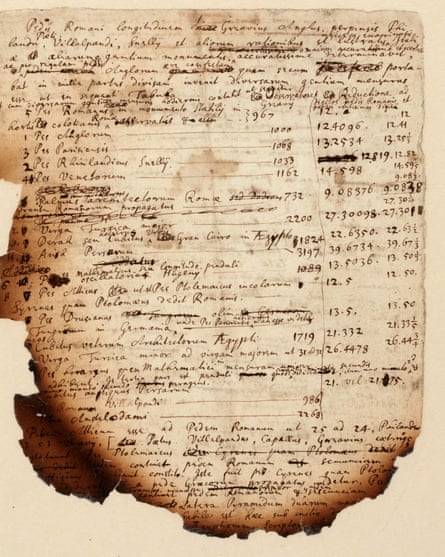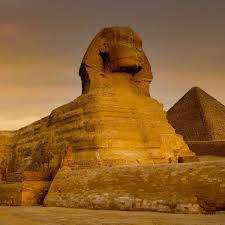Unpublished notes show he believed ancient structures held key to the apocalypse
Source: The Guardian
He is the mathematician who laid the foundations of classical physics, formulated the laws of motion and the law of gravity, and remains the epitome of the age of reason.
But Isaac Newton’s secret obsessions with alchemy and obscure branches of theology, which only came to light 200 years after his death, reveal another side to the man who helped shape the modern world.
Now unpublished notes showing Newton’s attempts to unlock codes hidden in the Bible and determine the timing of the apocalypse are now being sold by Sotheby’s. Three pages of scribblings on the Egyptian pyramids, which Newton believed held the key to profound secrets, are expected to fetch hundreds of thousands of pounds when online bidding closes on Tuesday.
In a variation on “the dog ate my homework”, the notes are scorched from a fire apparently caused by Newton’s hound, Diamond, jumping onto a table and tipping over a candle.
“These are really fascinating papers because in them you can see Newton trying to work out the secrets of the pyramids,” Gabriel Heaton, Sotheby’s manuscript specialist, told the Observer. “It’s a wonderful confluence of bringing together Newton and these great objects from classical antiquity which have fascinated people for thousands of years. The papers take you remarkably quickly straight to the heart of a number of the deepest questions Newton was investigating.”

Newton studied the pyramids in the 1680s, during a period of self-imposed scholarly exile at Woolsthorpe Manor in Lincolnshire, away from his base at Cambridge University, following criticism of his work by his rival Robert Hooke of the Royal Society.
Newton was trying to uncover the unit of measurement used by those constructing the pyramids. He thought it was likely that the ancient Egyptians had been able to measure the Earth and that, by unlocking the cubit of the Great Pyramid, he too would be able to measure the circumference of the Earth.
He hoped that would lead him to other ancient measures, allowing him to uncover the architecture and dimensions of the Temple of Solomon – the setting of the apocalypse – and interpret the Bible’s hidden meanings.
“He was trying to find proof for his theory of gravitation, but in addition the ancient Egyptians were thought to have held the secrets of alchemy that have since been lost,” said Heaton. “Today, these seem disparate areas of study – but they didn’t seem that way to Newton in the 17th century.”
Newton kept his obsession with alchemy and his heterodox religious beliefs – a rejection of the doctrine of the Trinity – to himself. This was not because he feared his faith might discredit his scientific work, or vice versa, but because his unorthodox views would cost him his career.
Although his reputation rested on his mathematical and scientific discoveries, to Newton these were secondary to his “greater” studies in alchemy and theology. A cache of manuscripts on these subjects surfaced at Sotheby’s in 1936; some of them were bought by the economist and Newton devotee John Maynard Keynes, who described his hero as “the last of the magicians”.
Heaton said: “The idea of science being an alternative to religion is a modern set of thoughts. Newton would not have believed that his scientific work could undermine religious belief. He was not trying to disprove Christianity – this is a man who spent a long time trying to establish the likely time period for the biblical apocalypse. That’s why he was so interested in the pyramids.”
Newton’s Philosophiae Naturalis Principia Mathematica, published in 1687, cemented his status as a scientific superstar. The culmination of decades of work and thought, the magnum opus outlined his theories of calculus and gravitation and the laws of motion, providing a new understanding of the universe.
A few years later Newton had a serious breakdown but recovered to be elected as an MP and appointed as Master of the Mint. He also became president of the Royal Society. After his death in 1727, he was given a state funeral and buried with full honours in Westminster Abbey.
He was a “prickly individual, always up for a feud”, said Heaton. Others have described him as secretive, neurotic, spiteful, vindictive, ruthless, arrogant, obsessive and paranoid. “He liked to think of himself as the new messiah, come to save the world,” according to Professor Patricia Fara, a science historian at Cambridge University.
But Newton’s genius is undisputed. “To everything he studied, everything he touched – religion, physics, mathematics, alchemy, chemistry – he brought incredible depth and complexity and originality,” said Heaton.
The papers are likely to be bought by a private collector, although institutional libraries may also put in bids. “There is a huge amount of interest in scientific books and manuscripts – it’s the biggest growth area I’ve seen in the past 10 or 15 years,” said Heaton. “We have complex attitudes towards many historical figures, but the great heroes of science still stand as tall as they ever did.”
Source: The Guardian

































Leave a Comment
You must be logged in to post a comment.